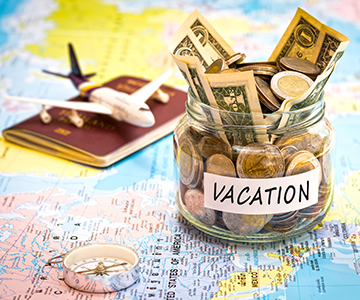For some, the thought of a vacation brings excitement, or maybe even relief to get away for a few days. However, others may be overwhelmed by the expenses. If you’re wondering how to afford a vacation, it may not be as out of reach as you think. When it comes to budgeting for vacation, if you can save, even a little bit each month, you can enjoy a trip without worrying about all the costs. My approach is to plan, budget and save.
Planning Ahead
After choosing your destination, it’s helpful to make a plan for every cost you know you will encounter. You can group these expenses into categories, such as: lodging, transportation, food and activities. From there, you can make decisions about how much you want to spend, and consider ways to save in each category. Do your research early to see where you can spend and where you can save when it comes to each of these four areas. For example:
- Lodging – Will you need a hotel, or can you stay with a friend or relative in your destination?
- Transportation – Will you fly or drive? If you fly, be sure to consider whether you will need a rental car once you arrive, or factor in ride share and public transportation costs. If you drive, try to estimate the cost of gas and the impact on your vehicle.
- Food – Will you eat out for every meal or buy a few groceries when you arrive and make some meals yourself? There are probably meals you’ll want to splurge on, and you may find perks such as breakfast being included at your hotel.
- Activities – Most tourist destinations have a convention and visitor’s bureau website that lists all the activities in the area. While some activities will surely cost money, there are tons of free entertainment and things to do in almost every destination as well. You can also look for deals if you buy tickets early or online, or if you buy as part of a package.
Expect the Unexpected
Another idea worth considering is to set aside a small amount of money for unplanned expenses. For example, when I traveled to Arizona last year, I arrived and realized I had forgotten to pack soap and shampoo as well as my pillow. I also had to get a car alignment while down there. Good thing I had planned for unexpected expenses! Keep in mind, the better you plan, the better you will be able to save.
Finding Room in Your Budget
This brings me to my next tip: budgeting. If you don’t already, track your spending for two or three weeks. This will allow you to see where you put every dollar and you may find yourself saying, “I spend that much money at the coffee shop each week?” There may be items like this in your budget that aren’t crucial to your day to day life and you could cut back in those areas, which would give you more money to save towards your goal each month. Check out our articles on How to Save More Each Month and Seven More Easy Ways to Save Money to get you started with ideas. If you can be disciplined in this area, you will reach your goal before you know it!
Now that vacation you’ve wanted to go on doesn’t seem so elusive anymore does it? Remember, plan, budget and save. Don’t throw away the idea of taking your family on a vacation before you properly weigh your circumstances. It may not be out of reach!








 Equal Housing Lender. SBA Preferred Lender. NMLS #440379
Equal Housing Lender. SBA Preferred Lender. NMLS #440379